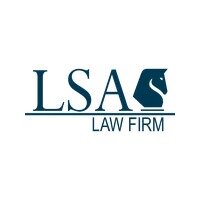Best Outsourcing Lawyers in Yerevan
Share your needs with us, get contacted by law firms.
Free. Takes 2 min.
List of the best lawyers in Yerevan, Armenia
About Outsourcing Law in Yerevan, Armenia
Outsourcing is an increasingly popular business practice across the globe, including in Yerevan, Armenia. It involves the delegation of certain business processes to external service providers, which can often lead to increased efficiency and cost savings. In Armenia, the outsourcing industry is experiencing growth, particularly in fields such as information technology (IT), customer service, and accounting. Understanding the legal framework that governs outsourcing agreements is crucial for businesses to ensure compliance and protect their interests.
Why You May Need a Lawyer
In a complex business environment, outsourcing arrangements can present legal challenges that require professional advice. Companies often seek legal help to draft or review outsourcing contracts to ensure they are balanced, compliant with Armenian laws, and without potential liabilities. A lawyer can assist in negotiating terms, handling disputes, and providing guidance on employment laws, especially when an outsourcing agreement involves transferring employees. Intellectual property, data protection, and confidentiality also require legal scrutiny in outsourcing deals. Furthermore, if cross-border elements are involved, international laws and regulations may require the expertise of a legal professional.
Local Laws Overview
Outsourcing in Armenia is primarily governed by the Civil Code, the Law on Information Systems and Services, the Law on Electronic Communication, and the Labor Code. Contract law principles found within the Civil Code set the framework for any outsourcing agreement. The Law on Information Systems and Services and the Law on Electronic Communication are particularly relevant when outsourcing IT services, as they regulate electronic transactions and provide guidelines for digital security and data privacy. The Labor Code is applicable when human resources are involved, overseeing employment contracts, employee rights, and termination procedures. Companies must also be attentive to tax regulations and potential liabilities involved in outsourcing.
Frequently Asked Questions
What legal aspects should be considered in an outsourcing contract?
An outsourcing contract should address the scope of services, performance criteria, confidentiality obligations, intellectual property rights, data protection policies, service provider liability, and termination conditions, among other aspects.
Is it necessary to have a written contract for outsourcing in Armenia?
While verbal agreements are legally binding, it is advisable to have a written contract to ensure clarity and provide documentation in case of disputes.
How are intellectual property rights handled in outsourcing arrangements?
Ownership and use of intellectual property created during the outsourcing arrangement should be explicitly addressed in the contract to avoid legal issues.
What happens if there is a dispute in an outsourcing agreement?
Outsourcing agreements typically include dispute resolution mechanisms, such as arbitration or mediation clauses. If these are not present or fail, parties may have to resolve disputes in Armenian courts.
Are there specific regulations regarding data protection in outsourcing?
Yes, companies must comply with Armenian data protection laws, ensuring personal data is handled securely and in accordance with any relevant legislation.
Can outsourcing involve international service providers?
Outsourcing can involve international service providers, but it's important to ensure the agreement adheres to international laws and the laws of both countries involved.
Are there any tax considerations when outsourcing services?
Taxation is a critical aspect, particularly regarding withholding taxes, value-added tax (VAT), and any tax benefits or liabilities that may arise from outsourcing services.
What employee rights need to be considered in an outsourcing scenario?
The Labor Code protects the rights of employees in Armenia, and any outsourcing arrangement should address employee transfer, retention, termination, and change in terms and conditions of employment with care.
How might changes in laws affect an existing outsourcing agreement?
Outsourcing agreements should include provisions that address how changes in the law will be managed and which party will bear the additional costs or obligations resulting from such changes.
Is it mandatory to involve a local Armenian service provider in outsourcing?
There are no laws mandating the involvement of local Armenian service providers; however, engaging with local companies can have practical and legal benefits, such as language and legal system familiarity.
Additional Resources
Those seeking further information on outsourcing in Armenia can consult the Ministry of High-Tech Industry for guidelines on IT services, the State Revenue Committee on tax issues, and the Data Protection Agency for matters on privacy and data protection. Professional legal advisors and business consultants also serve as valuable resources for companies engaging in outsourcing arrangements.
Next Steps
If you need legal assistance with outsourcing in Yerevan, Armenia, the next step is to contact a local attorney with expertise in contract law and the specific type of outsourcing you are considering. It is advisable to choose professionals who have experience working with both Armenian laws and any relevant international regulations. Scheduling a consultation with a legal expert is the first step towards ensuring your outsourcing endeavors align with the law and serve your business interests effectively.
Lawzana helps you find the best lawyers and law firms in Yerevan through a curated and pre-screened list of qualified legal professionals. Our platform offers rankings and detailed profiles of attorneys and law firms, allowing you to compare based on practice areas, including Outsourcing, experience, and client feedback.
Each profile includes a description of the firm's areas of practice, client reviews, team members and partners, year of establishment, spoken languages, office locations, contact information, social media presence, and any published articles or resources. Most firms on our platform speak English and are experienced in both local and international legal matters.
Get a quote from top-rated law firms in Yerevan, Armenia — quickly, securely, and without unnecessary hassle.
Disclaimer:
The information provided on this page is for general informational purposes only and does not constitute legal advice. While we strive to ensure the accuracy and relevance of the content, legal information may change over time, and interpretations of the law can vary. You should always consult with a qualified legal professional for advice specific to your situation.
We disclaim all liability for actions taken or not taken based on the content of this page. If you believe any information is incorrect or outdated, please contact us, and we will review and update it where appropriate.










